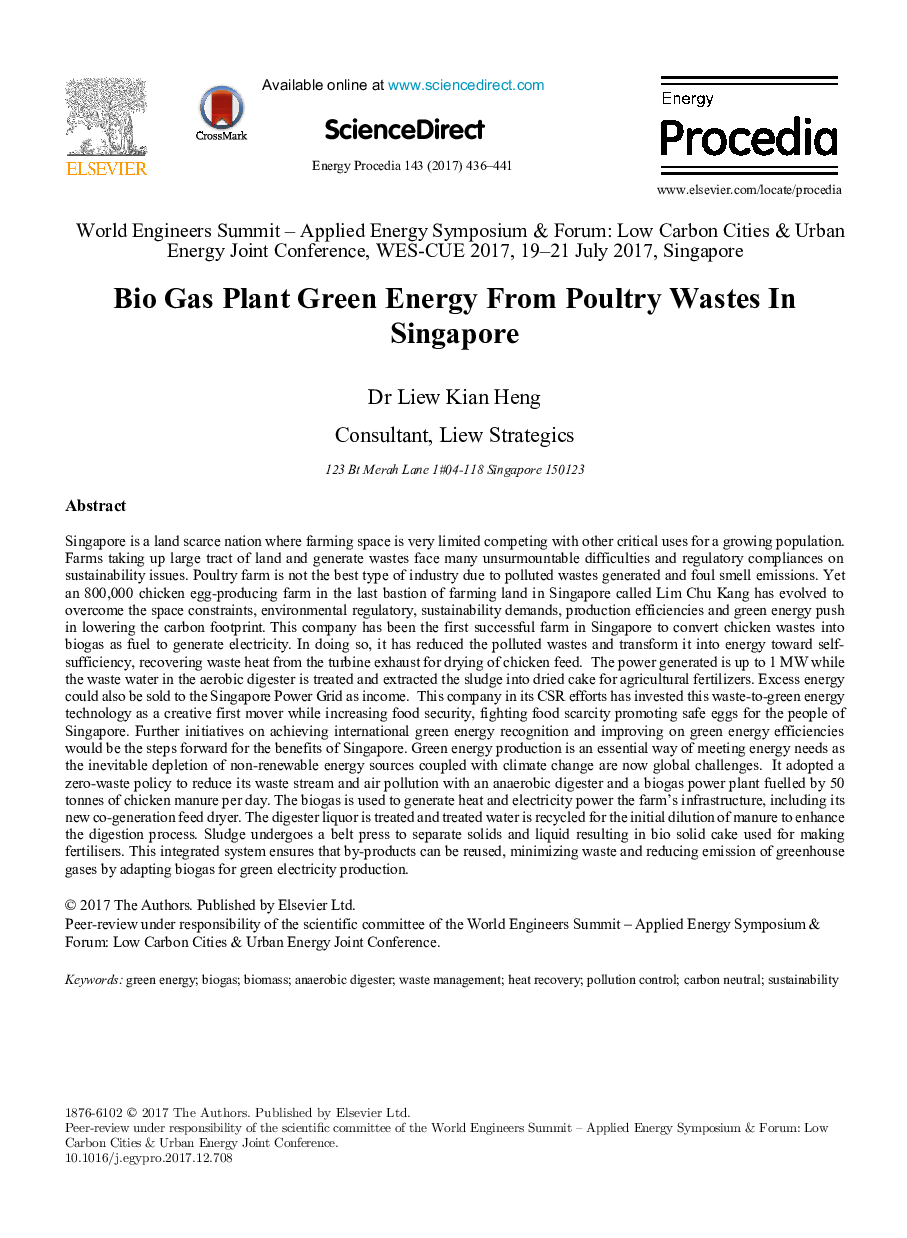| کد مقاله | کد نشریه | سال انتشار | مقاله انگلیسی | نسخه تمام متن |
|---|---|---|---|---|
| 7917058 | 1511092 | 2017 | 6 صفحه PDF | دانلود رایگان |
عنوان انگلیسی مقاله ISI
Bio Gas Plant Green Energy From Poultry Wastes In Singapore
ترجمه فارسی عنوان
گیاه زیستی گیاه سبز از زباله های مرغداری در سنگاپور
دانلود مقاله + سفارش ترجمه
دانلود مقاله ISI انگلیسی
رایگان برای ایرانیان
کلمات کلیدی
انرژی سبز، بیوگاز، زیست توده، بی هوازی مدیریت زباله، بازیابی حرارت، کنترل آلودگی، کربن خنثی، پایداری،
موضوعات مرتبط
مهندسی و علوم پایه
مهندسی انرژی
انرژی (عمومی)
چکیده انگلیسی
Singapore is a land scarce nation where farming space is very limited competing with other critical uses for a growing population. Farms taking up large tract of land and generate wastes face many unsurmountable difficulties and regulatory compliances on sustainability issues. Poultry farm is not the best type of industry due to polluted wastes generated and foul smell emissions. Yet an 800,000 chicken egg-producing farm in the last bastion of farming land in Singapore called Lim Chu Kang has evolved to overcome the space constraints, environmental regulatory, sustainability demands, production efficiencies and green energy push in lowering the carbon footprint. This company has been the first successful farm in Singapore to convert chicken wastes into biogas as fuel to generate electricity. In doing so, it has reduced the polluted wastes and transform it into energy toward self-sufficiency, recovering waste heat from the turbine exhaust for drying of chicken feed. The power generated is up to 1 MW while the waste water in the aerobic digester is treated and extracted the sludge into dried cake for agricultural fertilizers. Excess energy could also be sold to the Singapore Power Grid as income. This company in its CSR efforts has invested this waste-to-green energy technology as a creative first mover while increasing food security, fighting food scarcity promoting safe eggs for the people of Singapore. Further initiatives on achieving international green energy recognition and improving on green energy efficiencies would be the steps forward for the benefits of Singapore. Green energy production is an essential way of meeting energy needs as the inevitable depletion of non-renewable energy sources coupled with climate change are now global challenges. It adopted a zero-waste policy to reduce its waste stream and air pollution with an anaerobic digester and a biogas power plant fuelled by 50 tonnes of chicken manure per day. The biogas is used to generate heat and electricity power the farm's infrastructure, including its new co-generation feed dryer. The digester liquor is treated and treated water is recycled for the initial dilution of manure to enhance the digestion process. Sludge undergoes a belt press to separate solids and liquid resulting in bio solid cake used for making fertilisers. This integrated system ensures that by-products can be reused, minimizing waste and reducing emission of greenhouse gases by adapting biogas for green electricity production.
ناشر
Database: Elsevier - ScienceDirect (ساینس دایرکت)
Journal: Energy Procedia - Volume 143, December 2017, Pages 436-441
Journal: Energy Procedia - Volume 143, December 2017, Pages 436-441
نویسندگان
Dr Liew Kian Heng,
